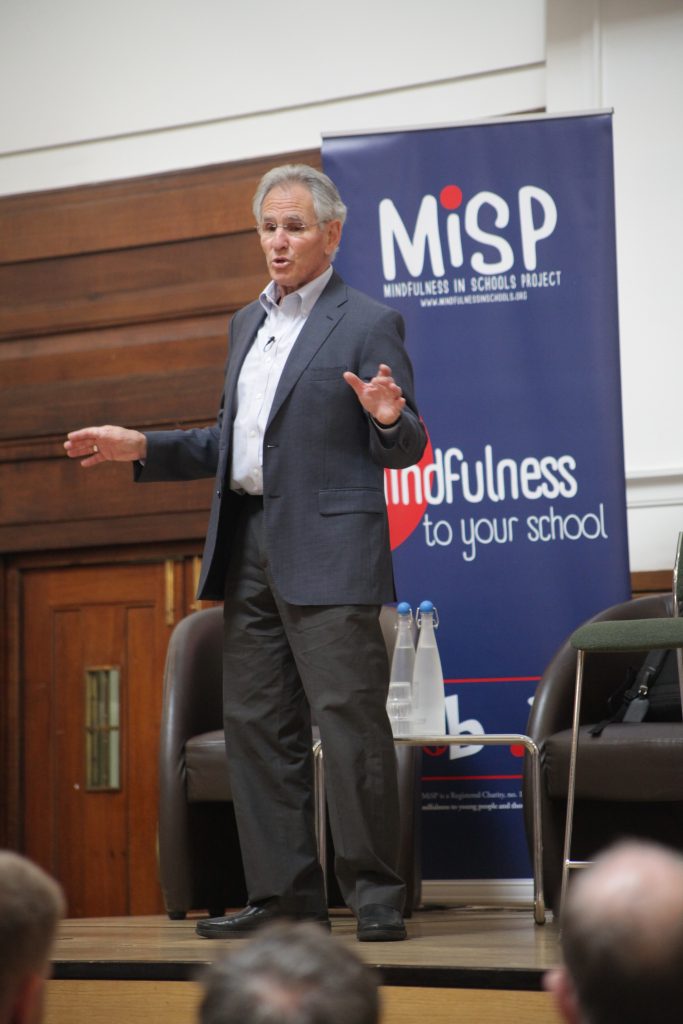 We are delighted to introduce Mindfulness in Schools Project patron: Jon Kabat-Zinn.
We are delighted to introduce Mindfulness in Schools Project patron: Jon Kabat-Zinn.
Jon is one of the founding fathers of contemporary mindfulness. Emeritus Professor of Medicine at the University of Massachusetts Medical School, it was Jon’s pioneering work at the renowned Stress Reduction Clinic that set the wheels in motion for what became Mindfulness-Based Stress Reduction (MBSR). Jon has been teaching MBSR for decades around the world. Jon was key speaker at our 2018 conference. We are delighted to have his ongoing support for our important work.
Below Jon gives his thoughts on a few important questions …
Can mindfulness improve children’s lives?
Mindfulness is about connecting with what is deepest, best, and authentic in yourself. This can lead to moments of major discovery, insight, and learning for all of us. This is no less so for children. Young people nowadays are under tremendous social and academic pressure: they don’t always feel great about themselves. Learning to cultivate mindfulness mindfulness in their everyday lives can help children to befriend who they really are instead of believing the narrative that they so often feel compelled to project. So yes, mindfulness has tremendous potential to improve their lives, inwardly and outwardly.
Why is it so important to teach it in schools?
Practising mindfulness has been shown in many studies to reduce individual suffering and increase wellbeing, even under very stressful circumstances. What if we could learn this skill early on in life? This is what mindfulness in education can do – catch people before suffering becomes deeply embedded and actually invite them to discover, uncover and recover capacities that we all have, that we are all born with, but often do not develop and make practical use of.
What does mindfulness provide?
Mindfulness is the recognition that you already complete and whole as you are. When one learns to bring it into ones daily life through actually culitvating it, both in moments of quiet, and in times of activity, that wholeness, that OK-ness as I am, so to speak, becomes more embodied and a reliable ground for learning, growing, and healing whatever wounds we might all be carrying from not being completely seen and accepted for who we are rather than judged, as is so often the case, only for how we perform. Our capacity for being mindful is not Eastern or Western, ancient or modern, it is simply human. It is in our DNA, yet without some kind of training and encouragement, it is all to easily ignored.
There is a common misconception that mindfulness is about being ‘calm’ or being ‘happy’. It is not. It is about living fully and facing all the moments we experience with greater awareness and recognition, including the more difficult and challenging ones. It is something we hope that all children and young people have the opportunity to experience and cultivate in themselves.
Can mindfulness improve learning?
When we become intimate with the mind’s potential to be open and not clogged up with what we think we know, then we can perceive what our minds might ordinarily be blind or closed off to – and that is how we learn. To be truly creative, we need to recognize and accept when we don’t know something, and to become unafraid of making mistakes. Mindfulness can help children to learn this attitude.
Can mindfulness really make the world a better place?
If mindfulness is going to mean anything in education – or anywhere else in the world – it has to come out of all of us together taking responsibility for the small and the large, the inner and the outer, ourselves and our global community – because in life itself, there really is no separation. The idea of ‘them and us’ is toxic, a form of tribalism and “othering” that often leads to injustice of one kind or another, and often harm of some kind. Bullying would be one example.
We all need to engage with a world we sometimes dislike. If we ignore the problems in education and elsewhere, they will never be adequately addressed and solved. Mindfulness in education has not only the potential to transform individuals but the whole of society.